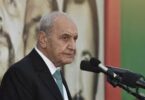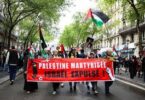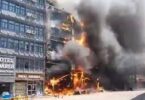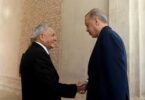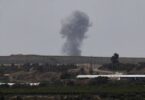DAMASCUS (AFP): Syria’s 12-year-long civil war has left more than half a million people dead and millions more displaced internally and abroad.
As Arab states discuss bringing President Bashar al-Assad’s regime back in from the cold, here is a summary of the main chapters in the conflict:
– Revolt to repression –
Protests erupt out in March 2011 at the height of the Arab Spring uprisings, after four decades of repressive rule by the Assad dynasty, President Bashar al-Assad having succeeded his father, Hafez, in 2000.
The regime cracks down violently.
An armed rebellion is launched with support from Turkey, the West and some Arab countries, including Qatar.
The Free Syrian Army (FSA) rebels seize large swathes of territory, including the centre of third city Homs and a chunk of second city Aleppo.
– Bloody stalemate –
FSA fighters launch the battle for Damascus in July 2012 but the government retains control of the capital, with rebels seizing some suburbs.
From 2013, regime helicopters and planes begin air strikes, often with barrel bombs, on rebel areas, according to the Syrian Observatory for Human Rights war monitor.
– Enter Iran, Hezbollah –
The same year, Iran-backed Lebanese Shiite militant group Hezbollah deploys fighters to back the Syrian government.
Iran also provides support to Assad.
– Gas attacks –
In August 2003, a chemical attack on two rebel-held areas near Damascus reportedly kills more than 1,400 people. The regime denies responsibility.
US president Barack Obama had warned that a chemical attack would be “red line” but pulls back from threatened punitive strikes, instead agreeing a deal with Moscow to dismantle Syria’s chemical weapons arsenal.
A sarin gas attack in April 2017 on the rebel-held town of Khan Sheikhun kills more than 80 people.
Obama’s Republican successor Donald Trump orders missile strikes on the regime airbase from where the gas attack was allegedly launched.
A year later, the US, France and Britain launch strikes after an alleged regime chemical attack on the rebel-held town of Douma, near Damascus.
– IS rise and fall –
The jihadist Islamic State group (IS) proclaims a “caliphate” in June 2014 in parts of Syria and Iraq, where it installs a reign of terror.
In September 2014, a US-led coalition launches air strikes against IS.
On the ground the Kurdish-led Syrian Democratic Forces (SDF) take the fight to IS, first routing it from its de facto capital of Raqa in 2017, and then in 2019 from its last holdout in the village of Baghouz near Iraq.
– Russia rescues Assad –
Syria’s main ally Russia launches a campaign of air strikes on rebel-held areas in September 2015, marking a turning point in the war.
Russia’s intervention helps the regime retake key rebel bastions, from Aleppo in 2016 to Eastern Ghouta on the outskirts of the capital in 2018.
– Turkey ire at Kurds –
Turkey carries out three ground offensives between 2016 and 2019 against Kurdish forces in northern Syria, whom it brands “terrorists” linked to the rebel Kurdistan Workers’ Party in Turkey.
The operations, followed by Turkish air strikes on Syrian Kurdish targets in November 2022, aims to push Kurdish forces back from the border with Turkey.
– Ceasefire –
The Syrian regime launches a offensive in December 2019 to retake the northwestern province of Idlib, the last major rebel bastion in Syria.
Russia and Turkey broker a ceasefire in March 2020 after months of fighting.
The truce largely holds but IS continue to launch sporadic attacks.
In January 2022, IS fighters attack a Kurdish-controlled prison in the northeastern city of Hasakeh to try to free jailed jihadists. Hundreds are killed in the week-long assault.
– Outreach to Assad –
In 2022, the defence ministers of Turkey and Syria meet in Moscow, signalling a potential rapprochement.
The February 6, 2023 quake that killed tens of thousands of people in Turkey and Syria accelerates moves by Arab states to bring Syria back into the fold.
A Chinese-brokered rapprochement between Iran and Saudi Arabia also adds to the momentum, with Riyadh hosting Syria’s foreign minister for talks on April 12.


